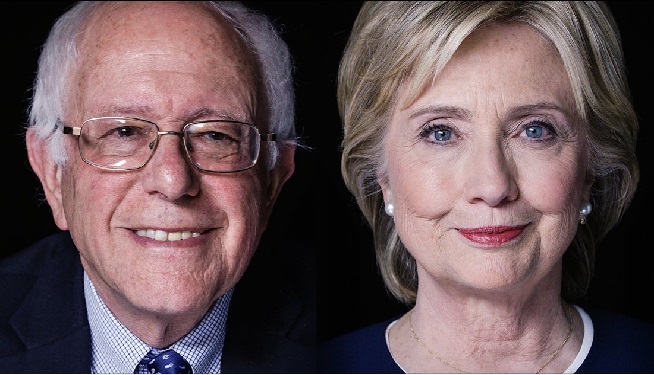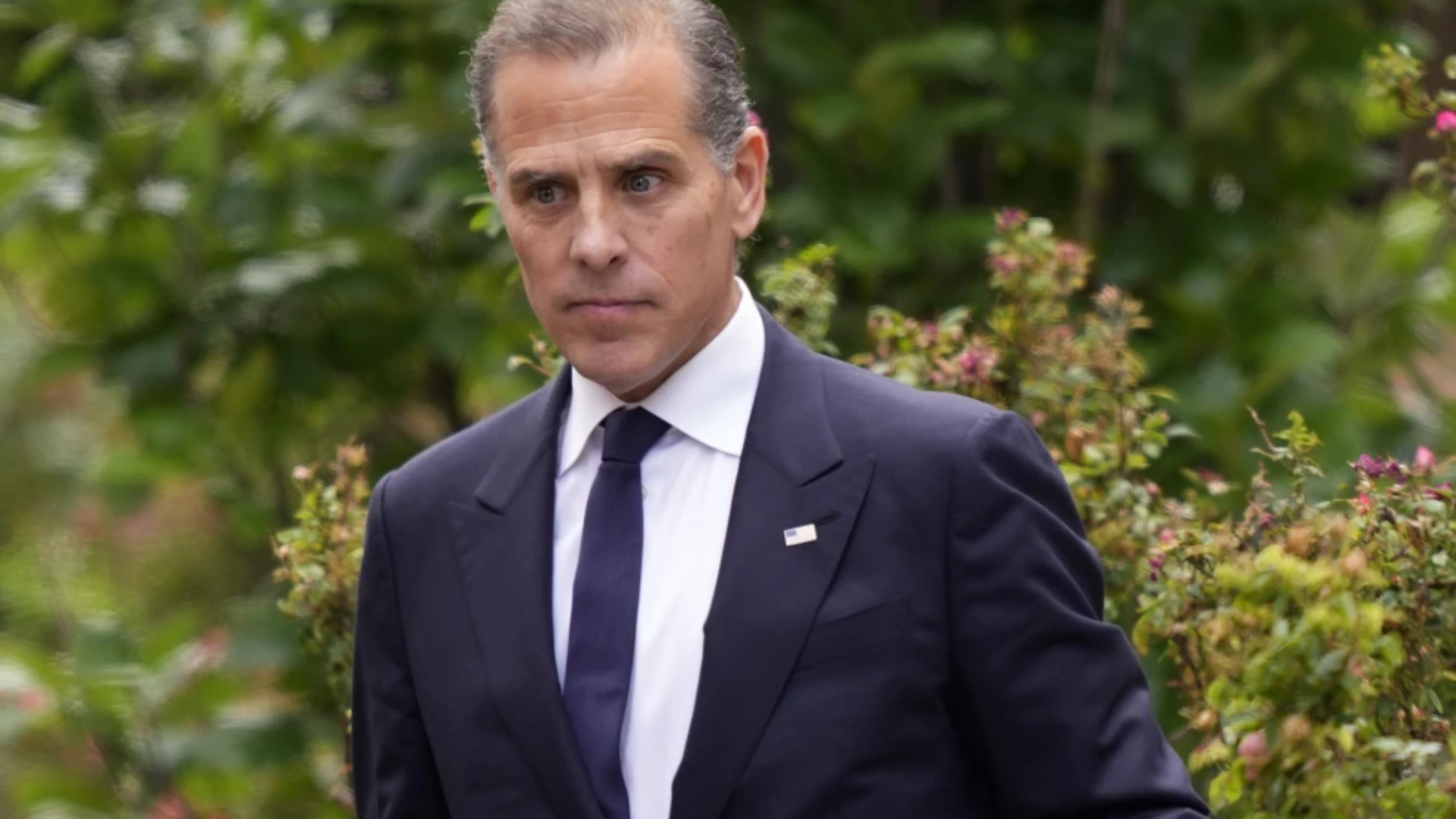COLUMBUS, OHIO — (CNN) Hillary Clinton and Bernie Sanders both accused Donald Trump of inciting violence, with the former secretary of state calling him “bigoted” and alleging he had perpetrated “political arson,” while the Vermont senator labeled him a “pathological liar” at a town hall on Sunday night.
“It is clear that Donald Trump is running a very cynical campaign pitting groups of Americans against one another. He is trafficking in hate and fear,” Clinton said during the event at Ohio State University hosted by CNN and TV One. “He actually incites violence in the way he urges his audience on, talking about punching people, offering to pay legal bills.”
Clinton charged that Trump was guilty of a case of “political arson” by throwing fuel on political divisions in the country.
“He has been incredibly bigoted towards so many groups,” she continued. “You don’t make America great by tearing down everything that made America great.”
Clinton followed Sanders at the town hall moderated by CNN’s Jake Tapper and TV One’s Roland Martin. Sanders and Clinton are making closing arguments to voters in their increasingly contentious Democratic nominating marathon, two days before five states vote in crucial primaries that could set the tone for the rest of the contest.
On Sunday night, Clinton’s comments followed Sanders’ own sharp criticism of Trump.
“I hesitate to say this because I really don’t like to disparage public officials, but Donald Trump is a pathological liar,” Sanders said.
Sanders also blasted Trump for saying that he might pay the legal fees of a man charged with punching a protester at one of his rallies, adding that doing so was tantamount to “inciting violence.”
“I would hope Mr. Trump tones it down big time and tells his supporters that violence is not acceptable in the American political process,” Sanders said.
In one of the most dramatic moments of the night, Clinton was asked by audience member Ricky Jackson — who spent 39 years in jail for a murder he did not commit, including a period on death row — to justify her support for the death penalty in some cases.
She replied that the states had proven themselves incapable of carrying out fair trials and said she would “breathe a sigh of relief” if the Supreme Court and the states began to eliminate capital punishment.
But she argued that there was a case for a “very limited use” of the death penalty in cases of “horrific” terrorist crimes in federal cases like the bombing of the Alfred P. Murrah Federal Building in Oklahoma City in 1995 during her husband’s administration.
Speaking directly to Jackson, however, she told him, “I just can’t even imagine what you went through and how terrible those days and nights must have been for all those years. All of us are so regretful that you or any person had to go through what you did.”
Jackson, who is an undecided voter, was then asked by Martin if he was satisfied with Clinton’s response. He replied, “Yes. Thank you very much. Thank you, senator.”
The town hall took place in the wake of Sanders’ surprise victory in the Michigan primary last week, which raised his hopes of competing with Clinton across Midwestern Rust Belt states.
They faced questions from Buckeye State voters as they vie for the support of blue collar and minority voters who underpin the Democratic coalition.
It also came at the end of a weekend filled with violence and disruption of Trump rallies, in which the real estate mogul pointed the finger at Sanders for the unruliness.
But Sanders said Sunday night, “Our campaign does not believe and never will encourage anybody to disrupt anything.”
He added that people have the right to protest even though he said other candidates’ rallies shouldn’t be disrupted.
“Trump has to get on the TV and tell his supporters that violence in the political process in America is not acceptable, end of discussion,” he said.
At the same time, Sanders dismissed the idea that he was responsible for the actions of all his supporters.
“Millions of people voted for me. If I have to take responsibility for everybody who voted for me, it would be a very difficult life,” Sanders said.
The town hall was also an opportunity for the two Democratic candidates to highlight their differences even if they didn’t meet face to face.
One questioner, Amit Majmudar, a radiologist born to Indian immigrant parents and Ohio’s poet laureate, told each one that he had one mission at the ballot box, to keep Trump out of office and asked what each would do to defeat Trump.
Clinton argued that she was the best candidate to take on Trump because she was “the only candidate who has gotten more votes than Trump” in the 2016 contests held so far.
She added that she was building a broad-based campaign to convince people that this was the highest-stakes election they had ever been involved in, explicitly because Trump was likely to be the Republican nominee.
And she said that the fact that Republicans had been “after me” for 25 years meant there wasn’t anything the GOP had not already dug up about her.
“I am not new to the national arena and I think whoever goes up against Donald Trump better be ready,” she said.
Clinton also said that there would be many arguments that Democrats could make against Trump but that she didn’t want to “spill the beans right now.”
“I am having foreign leaders ask if they can endorse me to stop Donald Trump,” Clinton said, though she declined to name any other than Italian Prime Minister Matteo Renzi, who she said had done so publicly.
Sanders, for his part, pivoted to his Democratic opponent on the issue of trade, which is emerging as a key theme on both sides of the aisle in the 2016 presidential race.
He lashed out at “corporately written trade agreements,” which he said were designed to shut down U.S factories and pay people “pennies an hour” in China and Mexico.
“One of the very strong differences between Secretary Clinton and myself — she has supported almost all of those trade agreements, I have vigorously opposed (them),” he charged.
At one point while talking about trade though, Sanders slipped in another backhanded slap at Trump. Defending his position on trade, Sanders said that he did not want to cut off the United States from global trade flows.
“Nobody is talking about building a wall around the United States,” Sanders said, before trailing off when people in the audience started chuckling. “Oh, I beg your pardon, there is one guy who is talking about building a wall. Let me rephrase it: no rational person is talking about building a wall.”
During Clinton’s appearance, she sought to match her rival’s rhetoric on trade after she was asked by a laid-off steel worker how she would deal with alleged dumping of steel in the U.S. market by foreign nations.
“I believe that the dumping is illegal and we have to summon up the political and the legal arguments to take it on,” Clinton said, specifically accusing China of the practice. Other nations, including Italy, South Korea and India have in recent months been accused of dumping corrosion-resistant steel in the U.S. market.
The town hall segment with each candidate concluded with a few more personal questions.
Clinton was asked to elaborate on her recent comment that she’s not a natural politician like her husband Bill Clinton or President Barack Obama.
Clinton turned the question into a way of stressing her particular skills while admitting her liabilities, saying she had worked hard to become a better politician but wanted to be more than just good at campaigning.
“I don’t want to be hired to be a constant candidate, I want to be hired to be the president because I think that I, in this moment in our country’s history, bring the combination of skills and understanding and experience that can be really put to work immediately to do all parts of the job,” she said.
She also said that the campaign skills of her husband and Obama are “poetry,” relating that “I get carried away and I have seen them a million times.” She added that such stump skills were not her forte.
Sanders, asked which ideological opponents he got along with the best, mentioned Oklahoma Sen. James Inhofe, even though he’s someone who Democrats have pilloried as a climate-change denier.
Though Sanders has been scoring some points on trade, Clinton has so far built a more diverse constituency resting especially on African-American voters and Hispanics and appears to have the edge going into Tuesday’s primaries in Ohio, Florida, Illinois, Missouri and North Carolina.
Still, Sanders has high hopes of good results in the Midwest in particular and has been driving his message that the economy is stacked against working Americans and underpinned by a corrupt political system.
Tuesday’s primaries are hugely significant because they make up the third-highest allocation of delegates available on a single day in the Democratic presidential race.
A new poll by The Wall Street Journal and NBC published on Sunday shows Clinton leading Sanders for the three biggest prizes available on Tuesday. She is up 61% to 34% on Sanders in Florida, leads him by 58% to 38% in Ohio and by six points in Illinois.
Sanders will be hoping that last Tuesday’s results are an omen for this week after he went into the Michigan primary trailing badly in polls but still managed to best Clinton.
The former secretary of state, however, is looking to further bolster her lead in delegates over Sanders on Tuesday.
According to CNN estimates, Clinton has 1,244 delegates (including 772 pledged delegates and 472 superdelegates). Sanders has 574 delegates (including 551 pledged delegates and 23 superdelegates).
Superdelegates are party officials and lawmakers who can vote at the convention and have already made their intentions clear.
CORRECTION: This story has been updated with the correct number of superdelegates for Vermont Sen. Bernie Sanders.
The-CNN-Wire ™ & © 2016 Cable News Network, Inc., a Time Warner Company. All rights reserved. (PHOTO: CNN)






















